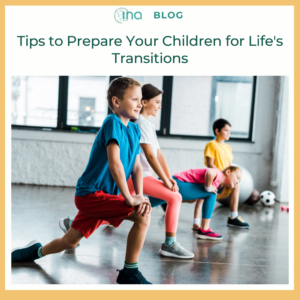 Life is full of changes. Whether you and the family are moving, you’re welcoming a new sibling into the family, or you’re preparing your child to transition into the routine of school, learning how to cope with change is an important part of growing up. Here are some helpful tips to help prepare the children in your care for the many transitions of life that happen.
Life is full of changes. Whether you and the family are moving, you’re welcoming a new sibling into the family, or you’re preparing your child to transition into the routine of school, learning how to cope with change is an important part of growing up. Here are some helpful tips to help prepare the children in your care for the many transitions of life that happen.
Foster open communication.
It’s natural for parents and nannies to want to help anxious kids, telling them that their worst fears aren’t going to materialize. While it’s okay to encourage them that things will turn out okay in the end, be careful not to minimize the feelings that they communicate with you. Keep the lines of communication open as much as you can by encouraging them to ask questions about what’s bothering or worrying them. Listen to those things, try to find answers and solutions to the questions, and reassure them that the feelings and questions they are having are not out of the norm.
Find the positives.
Ask your children to write or share some positive things about the upcoming transition. For example, if they are starting a new school, have them list some exciting things that can come from that (new friends? New things they will get to learn?). If you are moving to a new neighborhood, have them brainstorm some positives that will come with a new place to live (a bigger room? New friends in the neighborhood?). Once the kids can name some good things that will come from the transition, they will be better able to dwell on the good things that are coming, rather than feeling dread or anxiety.
Keep routines in place.
Children thrive on routines. Consistency makes them feel secure and when routines are upended, their structure feels out of control and stressful. So, when changes are happening, try to keep your children’s routines as stable as possible – bedtimes, meal times, story times – the more predictable you can keep things, the better.
Encourage problem solving.
Once your children have voiced some concerns, questions, or fears, start working through each one together in a problem-solving manner. Ask them to dive into those individual questions or concerns more deeply, then start working together on how you can find some solutions on how to calm or ease those worries. Once you discover a solution together, have them focus on that and practice what would happen in a situation where that problem and solution will play out. Try to remember that your role here is to guide – helping them to uncover what the solution is. This gives them a real-life opportunity to solve problems, and it will encourage them to do that later down the road when other transitions or changes come at them.
Many children – even adults – struggle with transitions in life. Praising them when they do well is important. And support – no matter how big their feelings or mood swings are – is critical. Teaching them valuable coping skills early in life will help them to handle bigger life shifts as they get older.
